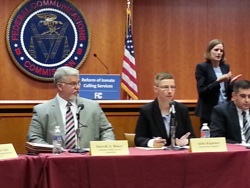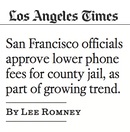Aleks Kajstura gave an invited presentation of our research on two different workshop panels, highlighting the importance of fees and comprehensive reform.
by Leah Sakala,
August 20, 2014

While the Federal Communications Commission’s historic ruling to rein in the prison telephone industry last summer was a huge step forward, there’s lots more to be done. That’s why last month the Commissioners held a Workshop on Further Reform of Inmate Calling Services to gather additional information from experts and industry participants (transcript).
Prison Policy Initiative Legal Director Aleks Kajstura gave an invited presentation of our research on two different workshop panels, highlighting the importance of addressing the wide spectrum of “ancillary fees” in regulation and explaining why fair phone charges must extend to both prisons and jails:
A particular highlight from the workshop was Darrell Baker, the Director of the Alabama Public Service Commission, who described his Commission’s strong new regulation to bring down prison and jail phone call rates and fees in his state.
We commend the FCC for continuing to work towards comprehensive regulation of this deeply broken industry. As we’ve recently blogged, even after the FCC’s initial order was issued last year industry players have wasted no time raising charges and devising new ways to put basic communication out of reach for the families of incarcerated people around the country. And, as Congresswoman Eleanor Holmes Norton pointed out in her remarks at the workshop, a lot is at stake in the struggle for fair communications policy:
We have documented that of all the approaches, the many approaches that are used to reduced recidivism, the one that we can document has the greatest effect is stimulating communication from behind those bars with people in the greater society who will support them and who love them.
Stay tuned (and sign up for our newsletter for the latest updates!) as we continue to fight alongside our colleagues for fair prison and jail communications policy.
by Peter Wagner,
August 19, 2014
On Sunday, John Oliver did an amazing piece about Ferguson, Missouri and the effects of the unnecessary militarization of the police. (Warning: NSFW for language.)
See also the ACLU’s report from June of this year: War Comes Home: The Excessive Militarization of American Policing. As we summarized in the Research Clearinghouse:
“Using… federal funds, state and local law enforcement agencies have amassed military arsenals purportedly to wage the failed War on Drugs, the battlegrounds of which have disproportionately been in communities of color.”
Verizon says no; but the industry and sheriffs say yes to ripping off poor families and endangering public safety.
by Sarah Hertel-Fernandez,
August 12, 2014
The prison and jail communications industry all too often isolates those incarcerated and preys on their families. Despite the FCC issuing a cap on phone rates last year, the companies are raising their fees and innovating exploitative new practices like video-only visitation. Regulation of the cost and quality of communication is more necessary than ever.
The evidence is continuing to mount, and it’s also coming in from some unlikely sources. Verizon, one of the largest telecommunications companies in the country and a previous participant in the prison phone industry, submitted this powerful amicus curiae in an ongoing lawsuit where the industry is trying to halt the FCC’s preliminary regulations. Verizon supports the FCC’s conclusion that “site commissions are not reasonably and directly related to the provision of inmate calling services” and so cannot be “recovered” by inflating rates charged to their end users– the families and friends of those behind bars. After all, “[t]he FCC is required to ensure that the charges for the interstate telecommunications services are ‘just and reasonable'”; and as the company explained in a blog post: “Everyone benefits when inmates successfully transition out of the prison system [and that] affordable contact with family and friends while in prison can help make that happen.”
 Verizon isn’t alone. A growing number of state and local governments are losing patience with the system. Lee Romney wrote this great article for the LA Times on how government officials in San Francisco are pushing back against predatory rates. California already bans state prisons from accepting commissions, and is considering a bill to ban county jails from accepting commissions and require them to award contracts to phone companies that offer the lowest cost of service for those incarcerated. Opponents of the bill say that the commissions are used to fund inmate services, but as lead sponsor Assemblyman Quirk says: there are better sources of funding “than taxing grandma”.
Verizon isn’t alone. A growing number of state and local governments are losing patience with the system. Lee Romney wrote this great article for the LA Times on how government officials in San Francisco are pushing back against predatory rates. California already bans state prisons from accepting commissions, and is considering a bill to ban county jails from accepting commissions and require them to award contracts to phone companies that offer the lowest cost of service for those incarcerated. Opponents of the bill say that the commissions are used to fund inmate services, but as lead sponsor Assemblyman Quirk says: there are better sources of funding “than taxing grandma”.
 But the industry is always evolving. Cari Wade Gervin’s article for Metropulse reports on a disturbing new trend: in Knox County, Tennessee, video visits have replaced in-person visits entirely. She follows the money trail for the implementation of this program.
But the industry is always evolving. Cari Wade Gervin’s article for Metropulse reports on a disturbing new trend: in Knox County, Tennessee, video visits have replaced in-person visits entirely. She follows the money trail for the implementation of this program.
The plan will supposedly save both the families and facilities money, and in theory will increase overall accessibility and safety. In practice, the exorbitant and unregulated fees charged to the families reduce accessibility. And of course, left off the county’s balance sheet are the incredibly damaging psychological and social costs of eliminating in-person visits.
The kicker is this: Video visitation isn’t a random choice on the part of the Knox County Sheriff. It has been massively incentivized by companies — in this case, installation and future maintenance would be provided by Pay-Tel for free, “provided every 15-minute video session would cost $5.99. The county would receive 43.75 percent of those fees… Any revenues go straight to the county’s general fund.” Metro Pulse asked PPI Director Peter Wagner for his reaction: “This is such a uniformly bad idea, I’m kind of speechless.”
Gervin delved deeper into how the profit motive is skewing correctional priorities in her companion blog post: Tech Friends, the company that provides the kiosks used in Knox County, sells their units with the insidious-sounding promise that they will Reduce Inmate Movement and Reduce Jail Traffic. “Seriously,” writes Gervin, “it actually says that part of the point of video visitation is reduce visitors.”
The American Constitution Society has posted the video (and some pictures) from my remarks accepting the David Carliner Award.
by Peter Wagner,
August 12, 2014
In June, I was honored to receive the American Constitution Society’s 2014 David Carliner Public Interest Award. The award “recognizes outstanding public interest lawyers whose work best exemplifies its namesake’s legacy of fearless, uncompromising and creative advocacy on behalf of marginalized people.”
David Carliner (1918-2007) was one of the great public interest lawyers of the 20th Century. He challenged segregation and state bans on interracial marriage, and he fought for the rights of immigrants and the LGBT community. As the founder of the National Capital chapter of the ACLU and the International Human Rights Law Group (now GlobalRights), he was a strong defender of civil liberties and human rights at home and abroad. Carliner liked to say that one shouldn’t mind being an agitator since agitators are the ones who get the dirt out.
I consider the award both a big personal honor and a milestone for the criminal justice reform movement. I went to law school a decade ago when prison populations were going up, and up, and up seemed like the only future. Both the powers that be — and the established progressive movement — were ignoring criminal justice advocates and the idea of criminal justice reform. Things have changed, and it was an honor to celebrate that fact with more than a 1,000 progressive attorneys — including some of the colleagues who encouraged my work over the last decade.
The ACS recently made the video of the award presentation and my remarks available:
(The video starts with ACS President Caroline Fredrickson introducing the award, then David Carliner’s granddaughter Sarah Remes, presenting the award at 3:13, and then my remarks start at 6:30.)
And here are some pictures from that evening:
by Bernadette Rabuy,
August 11, 2014

Today, I had the opportunity to sit down with Sophia Robohn, a Hampshire College student who has been interning at Prison Policy Initiative. Read below to learn more about Sophia.
What brought you to Prison Policy Initiative?
I’m completing a Reproductive Rights Activist Service Corps (RRASC) internship through the Civil Liberties and Public Policy Program at Hampshire College.
Can you tell me more about the internship program?
RRASC sends interns to disciplines that intersect with reproductive rights and gender equality. These disciplines include immigrant rights, local food, and education.
What are some of your interests?
I study medical anthropology and women’s health at Hampshire College. I am heavily involved in feminist studies and activism at Hampshire College as well as emergency medicine.
What projects have you been working on at Prison Policy Initiative?
I have started research on the way school boards district when they have prisons within their boundaries and how that affects the principle of “one person, one vote.” This has included calling everyone from school board secretaries to court judge executives to find district maps, population data, and how they use Census Bureau data to draw their districts.
Why are school boards important?
While there tends to be more interest in congressional districts, school boards can be more heavily impacted by redistricting. I have also seen the way that local politics interfere with school boards. At the end of the day, school boards are responsible for important tasks such as determining school budgets as well as curricula.
What has surprised you about the work you’ve done?
There is a widespread lack of knowledge on how places district and the history of redistricting among school boards. I’ve had superintendents ask me to send them their own district maps because they don’t have a copy. I’ve talked to school board secretaries who know nothing about how their school board is set up or elected.
What has been particularly challenging about the work?
The most difficult part about understanding how school districts work is knowing who to call and when to do so when it seems like you have run out of options. From that, I’ve learned that it’s important to find out if the school district used a demographer or if the district drew the lines themselves. Sometimes, this is in crayon or marker, making maps difficult to decipher. For example, Warrior Run School District in Union County, Pennsylvania has a map that is particularly hard to read and drawn in marker. For El Reno School District in Oklahoma, the map is on the back of a newspaper clipping and is over 20 years ago. Another challenge is finding the right words to say. For example, precinct can mean a polling place in one school district, and, in another school district, it can mean an actual district with boundaries. Terms vary by state and even by county.
What are some questions that you are still hoping to explore?
I’m hoping to learn more about why school boards choose districts over at-large representation in certain areas of the country.
Thank you for your time. Best of luck!
Thank you! I’m really excited about the work I did at Prison Policy Initiative this summer, and I will be on the lookout for future work on prison gerrymandering.
Thanks to Sophia, we will have updates coming soon to our Prisoners of the Census page. Stay tuned!
Awesome piece with one small mistake on the difference between prisons and jails.
by Peter Wagner,
August 4, 2014
In case you missed it, two weeks ago comedian John Oliver did an amazing 17 minute piece on the U.S. prison system on his Last Week Tonight program:
Now as Cari Gervin notes on the Metro Pulse blog, one thing that Oliver gets wrong is the difference between prisons and jails:
It’s a good piece, and it should make you infuriated—the state of mass incarceration in this country is atrocious. Privatizing—and profiting from—locking up people is really screwed up. But there’s one point Oliver misses. Right after showing a clip from Sesame Street, Oliver says, “At least Sesame Street is actually talking about prison. The rest of us are much happier completely ignoring it, perhaps because it’s so easy not to care about prisoners. They are by definition convicted criminals.”
Actually, 428,000 of the people locked up each day are presumed innocent. They have either just been arrested and are trying to make bail, or they are too poor to make bail and are being held until trial. Now this population is a portion — 18% — of the 2.4 million people who are locked up, but the speed at which people churn through jails adds up to big numbers: jails lock up 12 million people over the course of a year. That’s a lot of people, and as Cari Gervin notes: “conditions in local jails are often much worse—and more restrictive—than state or federal prisons”. She attributes the conditions to the fact that “municipal budgets are even more strapped than state budgets” although I’d make the point that because jails are all operated independently, there is less oversight and less attention paid to identifying and following best practices.
Now one of the worst practices is the idea of making families pay to visit their loved ones, and that’s something that to my knowledge exists only in jails, as I can’t imagine a state prison system banning in-person visitation and requiring people to use expensive paid video visitation instead. But sadly, a number of jails do this, and that’s the subject of Cari Gervin’s excellent cover story in Metro Pulse about the Knox County, Tennessee jail.
 Toward the end of the Last Week Tonight video, Oliver sits on a stoop talking to puppets about their parents in jail. “That’s actually a zoo, that’s different,” Oliver says to an crocodile complaining that his “daddy’s in jail and people pay money to see him.”
Toward the end of the Last Week Tonight video, Oliver sits on a stoop talking to puppets about their parents in jail. “That’s actually a zoo, that’s different,” Oliver says to an crocodile complaining that his “daddy’s in jail and people pay money to see him.”
The comedic effect gets lost when you consider just how much money people have to pay to see their incarcerated human relatives.












